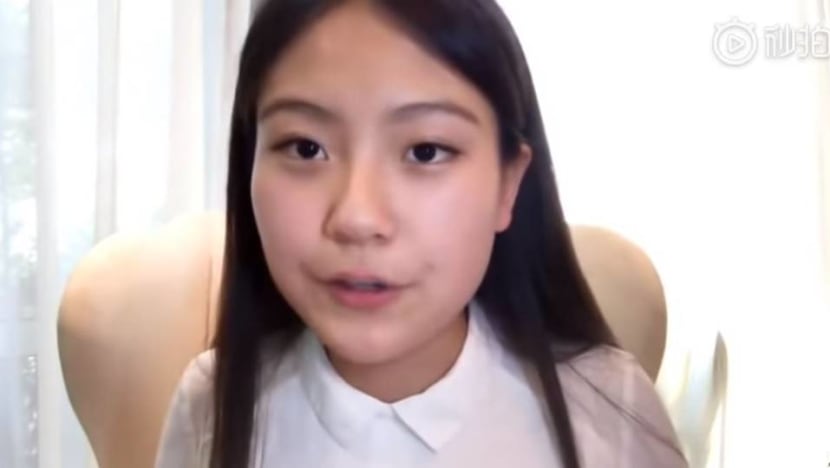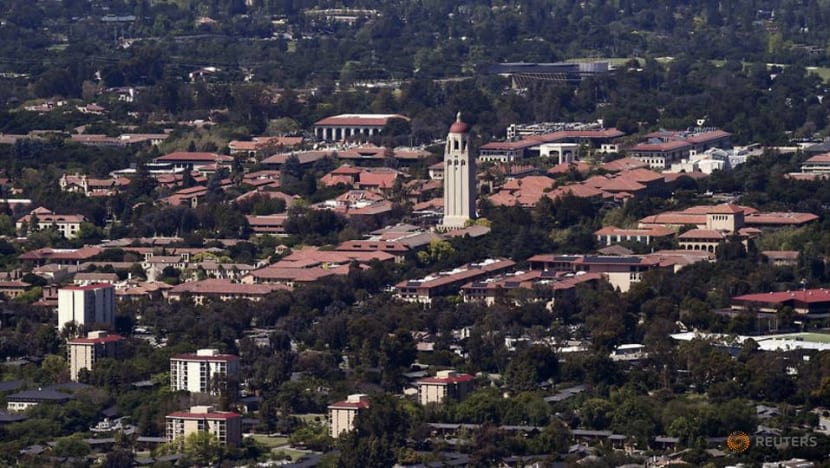commentary Commentary
Commentary: This Asian obsession with Ivy League schools has got to stop
The academic prep scene in China - a mix of boarding institutions, prep schools and coaching classes - has been brimming with activity over the last decade, says Tom McGregor.

Screengrab from YouTube of a video posted by Molly Zhao Yusi where she explains how she got into Stanford University.
BEIJING: In China, as is throughout most parts of the Asia-Pacific, many parents harbour an Ivy League fantasy for their children.
They dream that their young son or daughter will grow up to get accepted at the best elite American schools, either one of the Ivy League universities or a well-known brand name like MIT.
So obsessed are parents that some, like mother of Stanford student Molly Zhao Yusi who forked out millions to see her daughter get an education of value at Stanford, are willing to go to great lengths and underhanded means to give their young ones that headstart.
Lawyers of Zhao’s mother released a statement in which she said she was led to believe the money was a legitimate donation that would fund scholarships and staff salaries at the university yet Stanford said it never got the money – and proceeded to expel Zhao.
READ: Should universities even accept donations from hopeful parents? A commentary

SCHEMING FOR ENROLLMENT
The academic scene in China, a mix of boarding institutions, prep schools and coaching classes, has been brimming with activity over the last decade, and buzzing with sweet promises of getting bright, promising kids into top-tier tertiary institutions around the world.
Academic recruiters have opened up an offices in many major Chinese cities, often in upper-middle class or upper-class neighbourhoods.
Representatives will try to befriend families and entice them into thinking they have close networks with Ivy League admissions officers.
Many wealthy Chinese parents seek their consultation on how to apply to prestigious schools, thinking they can give their kids a leg-up. The recruiters routinely hire Westerners, who have graduated from America’s top schools, to “help fill out” applications, admissions essays and coach prospective applicants on how to answer questions from admissions officers.
Asian students are taught what to say and what to refrain from saying when a prestigious university recruiter interviews them. They are coached to sprout lines emphasising a deep personal interest when it comes to on-trend issues of the day that many left-leaning Ivy League universities are inclined towards, including climate change and tackling inequality.
They are pushed towards extra-curricular activities that US colleges look out for, including sports and business.
In China, the going-rate for hiring someone to fill out applications and write the admissions’ essay can come up to US$10,000. If services guarantee acceptance to a prestigious school, the average fee can skyrocket to some US$100,000.
And it’s easy to find a pen for hire – all it takes is an online search even if you don’t have the personal networks to connect you with a top-tier admissions mill.

READ: Tales of world leaders accused of plagiarism, academic fraud and cheating, a commentary
College consultants in China tread a very fine line. Most claim they only help the brightest simply present their best selves to university admissions, but cases of ghostwriting and downright fraud plague the industry.
BUT WHY HARVARD OR STANFORD?
Why go to such lengths for a well-known university education? Do the smartest kids need that paper qualification?
Might an Ivy League education be a vanity project, and rich families are simply lining up their heirs and heiresses for yet another feather in their caps?
Going to Harvard or Stanford might provide useful networks one can call upon in the future and exposure to some of the world’s greatest minds, but is no guarantee of success in a world of disruption which demands resilience, adaptiveness and creativity.
Many Chinese families value traditional and conservative values that emphasise hard work, honesty and integrity, but where does a road paved with good intentions but starts off with hiring college consultants for an unfair advantage lead to? Would that lead to college consultants then also helping college students with their coursework and essays when they reach university?
What happens when the college consultant isn’t there anymore?
And for families who expect their offspring to exercise leadership and take over conglomerates they’ve painstakingly built up or take good care of them in their golden years, what message are they sending exactly?
AT LEAST CONSIDER OTHER US SCHOOLS
Many Asian families care too much about academic rankings and won’t bother applying to schools that would be a better fit for their child. There’s an attitude worth reviewing.

College is more than just admission into a brand name. It is a formative number of years in a young person’s life that can shape how he or she might develop.
It’s worth parents thinking about choosing a school that fits their kids’ genuine interests, instead of shoe-horning them into a preconceived box that seems to check off their list of what success looks like.
Instead of helping their kids beat the admissions system, perhaps they should invest instead in truly developing their interests, instincts and knowledge.
READ: Go beyond financial aid to help our children succeed, a commentary
If they expect their offspring to do well in life, perhaps it’s also time they learnt to let go – because the game is finally up and no doubt admissions officers will take a harder stare when they next receive an application that looks eerily like the last one.
Tom McGregor is a commentator on Asia-Pacific affairs based in Beijing.














